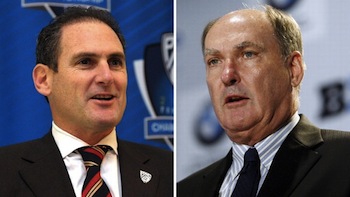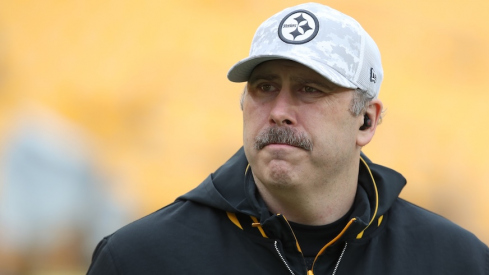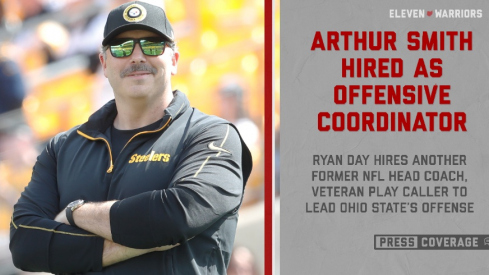While college football continues to squabble over how to best exploit its postseason, Jim Delany stays focused on his empire. He seems truly disinterested in talking about playoffs.
Sure, the B1G commissioner catches grief from all directions for presenting as a haughty, unsympathetic codger. He might be the biggest obstacle between making the leap toward a college football championship that makes sense from the over-thought exercise in overt corruption that the BCS currently is.
Delany is an accidental villain who refuses to be swept up or swayed by the squabble. He didn't create his conference or the bowl system. He inherited both, and he tinkers with both to his liking with only one intent: Equipping his conference with greater reach and power.
However cold he may be, Delany is laser-focused exclusively on the long term, which annoys virtually everybody in our short-term world. He deploys focus groups and delegates subordinates for the cosmetic stuff unrelated to his mission, like hyphenating trophy names nobody will remember or deciding which school is a Legend and which is a Leader.
That's unimportant stuff for another department and another guy. It's short-term and superficial. All Delany is concerned with is making B1G richer and more dominant, and if any idea or initiative doesn't satisfy that singular goal, he just isn't interested. He doesn't need to be interested.
It's not just the postseason that's under siege; it's the entire framework of college football itself. While other conferences were trying to strengthen themselves with numbers, Delany pulled in one school, Nebraska.
Then he called Larry Scott, whom he saw lapping the rest of the field by way of the sincerest form of flattery - to Delany.
Last summer during Expansion Fever, the PAC commissioner pulled off a media deal that would make Delany blush is he were capable of showing human emotion: He turned the PAC from a conference apathetic about its television contracts into a media powerhouse.
Scott locked up the distribution channels as well as competitors ESPN and Fox without dispensing of a single ownership share. Delany had given 51% to Fox to cement satellite business on standard tiers across American which was necessary to create a national channel. He required a partner to punch through the barrier.
That set the stage for every other conference to pile in through that hole in the wall he created. Only Scott stepped right through it.
The most profitable and far-reaching college TV network in America is BTN. The second-most profitable will be the seven PAC-12 Networks, which consists of the mothership in San Francisco along with six regional networks spread throughout the PAC's footprint.
By comparison, the SEC does not have a network; it basically leases a timeshare held by Disney that makes ESPN shareholders wealthier at the expense of the SEC’s sub-first tier content. That's why Mike Slive is now suddenly looking to fast-track the development and launch of an SEC network.
He's way behind B1G and PAC. They're lapping the field while we scream about plus-ones and rotating playoff sites.
There's a catch for Slive: Building a network is not that easy. MTN just turned out its lights. The ACC just undressed itself for ESPN and the Big XII and Big East deals cede power to the Worldwide Leader as well. The SEC doesn't have much of a geographical footprint; even worse, when its teams are lousy only the diehards outside of SEC country bother watching.
Dominance ebbs and flows in cycles. The decline of the B1G in football coincided with BTN, which provided the distribution framework in place to insulate B1G's institutions from any decline in on-field performance. Ask NBC what it thinks of its Notre Dame football ratings when the Irish are disappointing, which is a blip now entering its 19th season.
What does this have to do with setting the BCS on fire in favor of a playoff, like every other sport in the world enjoys? Everything. The power spectrum has no balance, and because of that Delany is still afforded the luxury of tinkering with college football to his liking.
While you’re looking forward to a new college football postseason football tournament, Delany is diligently constructing a fortress that won’t be completed on his watch. It probably won’t ever be completed. But the foundation has been in place since 2006. Slive is now where Delany was in 2005.
He’s already built his castle. Scott was the first commissioner to figure out what Delany was up to and followed suit with one of his own.
Meanwhile, you’re bickering about the landscaping and feigning outrage over the way Delany and Scott cling to relics like Pasadena in January, not realizing what the Rose Bowl means and forgetting about what happened in December.
Right, December. There was no forced promotion or elaborate press. It happened very quietly (there was a conference call; I sat on it for 45 minutes, and that was basically it). That's when the power spectrum tilted in acute fashion toward B1GGIE and PAC.
Starting this year, their schools will play each other extensively across multiple sports you probably refer to as not-football. Five years from now there will be what’s essentially a B1G-PAC challenge in football during the second, third and fourth weeks of each season, accompanied by other sports. So what?
 PAC & B1G Commissioners Larry Scott and Jim Delany: Chessmasters
PAC & B1G Commissioners Larry Scott and Jim Delany: Chessmasters
So prepare for a Michigan vs. Oregon weekend festival in Ann Arbor or Eugene with their field hockey, soccer and women's volleyball teams playing each other, culminating on Saturday at the Big House or Autzen Stadium when the helmets meet in the main event. Similar festivities will also happen in Columbus, Los Angeles, Bloomington, Tempe, Minneapolis and the Bay Area.
Football is and was the breadwinner for athletic departments; it's the black line on the balance sheet that cancels out the slew of red lines beneath it. Under this agreement it becomes the yeoman for larger attractions and more consumers while creating efficiencies in everything from transportation costs to promotional activities.
And it will happen with everyone watching on the two most profitable and extensive college networks in the country.
That amounts to mass expansion without the expense, legal headaches or risk of expanding. And a quarter of each season will directly build into that January relic in Pasadena whose importance you’ve either forgotten or no longer care to embrace.
B1G and PAC aren’t just committing to the Rose Bowl: By 2017 you’ll be getting an Opening Day Rose Bowl festival. It will bookend the season for both conferences and it will build significant wealth for stakeholders of Scott and Delany.
You think that new bowl game between the SEC and Big XII was a novel idea? It was a knee-jerk response to what B1G and PAC have built. They might as well have named it the Not-Rose Bowl.
Almost half of the top 50 television markets in the country and 43% of the population live in B1G/PAC-land. The SEC’s addition of Missouri and Texas A&M seems adorable by comparison. It's fun for alumni and die-hards, but that market is already loyal.
B1G and PAC know they're locked up; they're more keen on expanding their reach at a faster and more efficient pace that simply battling for market share fractions.
The Big East added Boise State. TCU is now part of...anyone remember? Anyone care? Delany and Scott certainly don't.
A B1G/PAC Challenge will join an already successful B1G/ACC Challenge in basketball, but with Opening Day-type trimmings and a departure from usual November fare against automatic-win opponents that only diehards tune in to see.
The Olympics are held every four years. Through this agreement you can expect an annual B1G-PAC Olympiad in, say, Los Angeles or Chicago with full publicity that attracts new and existing consumers.
Non-revenue sports? Not anymore, or at the very least not quite as red. And you already know who will control and carry those sports across the country while being able to demand top-tier national ad rates from its distribution framework to pass on to its member institutions.
 Imagine this image, but with different sports and currencies.
Imagine this image, but with different sports and currencies.
The B1G/PAC alliance significantly increases overall profitability for both conferences with almost no exposure to risk. The control they enjoy and the distribution networks they've built along with the enormous TV contracts they control trickle down - or gush, actually - and soak all of their member schools with cash from both domestic and soon, international viewing markets and consumers.
Les Wexner has donated tens of millions to Ohio State. T.Boone Pickens singlehandedly purchased Oklahoma State football's relevance. Imagine what a foreign Les or T.Boone could do for, say, Arizona State or Purdue. There are plenty of magnates like them beyond our shores who could become university donors if they just knew what the product was.
In that vein, PAC’s network is well into its plans of expanding into China, which begs the question: You know what’s cooler than marketing to a million middle class kids intent on going to college? Marketing to a billion middle class kids intent on going to college.
But yeah, Florida State in the Big XII would definitely be interesting. And should the playoff include four teams or maybe six? (Ed: I prefer six with two byes for top seeds, but Delany doesn't take my calls either)
Sports that currently fail to deliver the same widespread appeal and enthusiasm as football does will get a lift. B1G baseball is basically SEC ice hockey: An afterthought even inside of its footprint. Baseball is a non-revenue sport in the B1G. It shouldn't be.
Fewer non-revenue sports will depend on football for subsidization, which significantly raises each school's operating profit. Operating profit. B1G and PAC are baking a much bigger pie, but with the same number of slices.
While the Big XII, Big East, ACC and SEC have meetings on top of meetings on top of meetings to determine their positions, strategize, sometime synergize and - in one case - continually measure its overinflated and oversigned football phallus - Delany expanded his conference’s reach into every single time zone with a phone call and almost no investment.
He called Scott and pitched the idea, who agreed to it. It made too much sense and it had much more to do with the next 50 years of college athletics than it did the next five years of college football.
When Delany wants something it gets done. When he doesn't want something, he talks out of all sides of his mouth about it. Listen to him talk about playoffs, for example.
B1G and PAC have embarked on growth through shared investment and expansion without added overhead or headcount that's virtually bulletproof to anything the other four power conferences put together in response.
So why do they still cling to the Rose Bowl? It’s college football’s most prized fixed asset. Delany calls it “one of the top ten single-day television properties in the world.” It’s the home to the first national broadcast of any college football game as well as the first one broadcast in color.
If anything, Delany knows television properties. That's an asset he'll protect on account of his singular mission for his employer, which has the largest alumni base in the world to go with the PAC's largest collection of national titles across all sports. It's a marketing match made on paper. <--- this is a pun that involves large currencies
Beyond the Rose Bowl, B1G and PAC will be developing new bowl games of their own involving matchups that will be carried on their own national networks. Fewer checks will be written to develop and produce these games because more of the money will be staying in-house. That's the beauty of this agreement.
They're just taking their money machine and turning all of the knobs up as high as they can go. It might not make for a fair championship determiner, but that's not really their focus. That's not what their conferences need in the hyper-competitive world of academia.
While the SEC, Big XII, ACC and Big East are meeting with lawyers and combing over proposals and scenarios, B1G and PAC entered into a non-binding agreement with almost no chance for collateral damage, litigation or losses.
They’re insulated from any changes made regarding NCAA rules or governance, and if academic reform should ever strike no one is better positioned than the B1G/PAC alliance.
Your concern is the BCS, a playoff and the postseason. You’re vexed over how badly college football will screw up what should be a cash cow and a boon to your favorite sport. Delany comes across as aloof, unconcerned and stubbornly sticking to his ill-begotten or corrupt priorities.
Let’s just say he’s more focused on what he considers to be the big picture. Athletic Department liquidity. University endowments. Erasing subsidies for non-pigskin sports. Exponentially growing his already-prolific revenue generating machines.
On top of it all, B1G was way out ahead of the field prior to the agreement: All 12 B1G universities carry endowments in excess of a billion dollars (Michigan's should eclipse $10B this year). PAC doesn't have the same top-to-bottom wealth, but it does have some of the very biggest fish in the academic pond.
Meanwhile, the SEC, Big XII, ACC and Big East combined have just 16. As much as you love college football, its core purpose is the serve as a delivery system for money to the school. Delany's singular focus is on exploiting the delivery system and making it work better. He secretly thinks S-E-C chants are adorable.
Every move those four other conferences have made since that quiet announcement in December has been a futile attempt at catching up with what B1G and PAC pulled pulled off without even having to declare projected revenues.
They will fail. They might not even be able to close the gap. Delany has already laid the groundwork for generations and B1G’s streets are lined in billions. His job is protecting his assets and shareholders, even if it’s at the expense of what you would prefer to see happen on the field in January.
While college football continues to squabble over how to best exploit its postseason, Jim Delany stays focused on his empire. He seems truly disinterested in talking about playoffs. That's because it's not his game anymore. He basically stopped playing in December.
That's when he quietly called checkmate.


